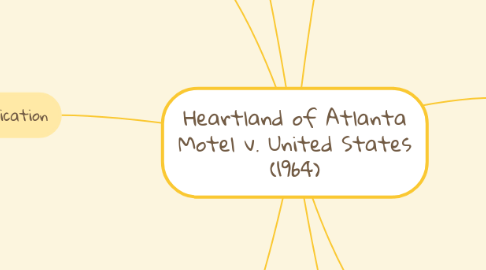
1. Rule of Law
1.1. Is the ban of racial discrimination related to free trade between States?
1.1.1. Does the power of Congress over trade in a national level set authority on local businesses?
1.2. No other precedent case was considered relevant but detailed historical referral to Gibbons v. Ogden and Act of 1875 was made
2. Analysis/Application
2.1. Petitioner sues for a controversial case requesting declaratory relief
2.1.1. He claims the Civil Rights Act under the power of the free trade violates the 5th Amendment ("he can't choose his customers")
2.1.1.1. He also claims that it violates the 13th Amendment ( " he is asked to rent rooms to blacks without his will")
2.1.1.1.1. No evidence is given by the petitioner but he admits he refuses to rent rooms to African- Americans.
2.2. Us attorneys stated that the power of Congress over trade has application in laws concerning public accommodations for travelers between states
2.2.1. The power of Congress is effective not only for merchandise but for travelers as well
2.2.1.1. The Civil Rights Act is not in power only through Congress trade law but also because it is morally right
2.2.1.1.1. Petitioner's actions might have a national damaging impact in national trade
2.3. Judges Douglas, Black but especially Goldberg use mainly the authority of the 14th (precedent) Amendment( equal protection) instead of the power of Congress over trade.
2.3.1. Judges emphasize the need for change due to the decreased state segregation and increased transportation between states
2.3.2. The main litigation argument is human rights and personal dignity and not economics
2.4. The court's decision was based on the " State Action Doctrine"
2.4.1. Discrimination was banned in public places and not in private
2.4.1.1. The power of Congress over trade was used to ban racial discrimination in private businesses serving the public
3. Impact
3.1. " US v. Morrison" ,2000. The case is based on sex violence that affects interstate trade and has national economic impact
3.2. "Jim Craw" laws were state and local laws that were reinforced in the southern states. They promoted segregation and racial discrimination in public areas like transportation and accommodations
4. Influence
4.1. The "equal employment opportunity" and " affirmative action" are based on Civil Rights Act related to trade. Employment decisions should not be based on race,color, national origin,gender or age because this will have social, moral and economic impact in a national level
4.2. Sexual harassment laws in a working area definitely have a Civil Rights Act origin and precedent cases such as " Heart of Atlanta v US" and " Morrison v US"
5. Facts
5.1. Parties
5.1.1. Heart of Atlanta Motel Inc. (Plaintiff)
5.1.2. United States (Defendant)
5.2. What happened
5.2.1. Congress passed the Civil Rights Act in 1964
5.2.1.1. It bans racial discrimination in public places
5.2.2. Congress regulates trade between states
5.2.2.1. Most of the hotel's customers are out state
5.2.2.1.1. The owner claims Congress exceeds its power over trade
5.3. Procedural history
5.3.1. The owner of the hotel asks that the Civil Rights Act to be found unconstitutional
5.3.1.1. The District court confirmed the Civil Rights Act as constitutional and ordered the owner to discontinue practicing discrimination
5.3.2. The owner of the hotel appealed to the Supreme Court
5.3.3. The Supreme court issued the final decision of preserving the lower's court decision
5.3.3.1. The US Supreme Court maintained the Civil Rights Act (Title II) as constitutional
6. Issue
6.1. Is the Civil Rights Act unconstitutional?
6.2. Is the 14th Amendment violated?(equal protection of the law)
6.3. Is the 5th Amendment violated?
6.4. Can Congress ban racial descrimination in hotel accomodations under the power of Congress in trade?
6.5. Is the 13th Amendment violated?
7. Conclusion
7.1. Racial discrimination discouraged travel between states.That was a matter of national morality
7.1.1. The Distric's Court decision is constitutional
7.1.1.1. The Civil Rights Act is constitutional
